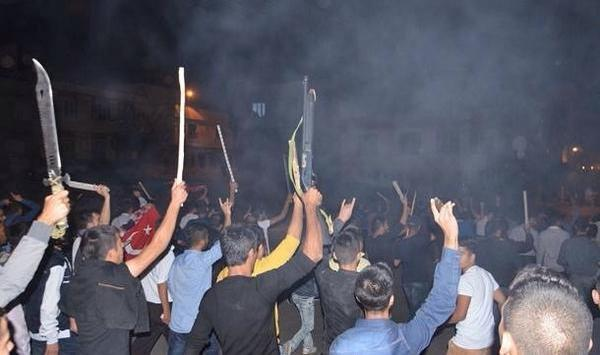ISIS
now controls 40% of Kobani – top US official
Islamic
State forces have made new gains in Kobani, now controlling about 40
percent of the Syrian town of Kobani on the Turkish border and might
well capture it, Deputy US National Security Adviser Tony Blinken has
said.
RT,
10
October, 2014
“I
don't know what's going to happen because again in the absence of any
ground force there, it is going to be difficult just through air
power to prevent ISIL (IS) from potentially taking over the town,"
Blinken told reporters at a briefing in London on Friday.
"They have taken at least 40 percent (of the town)," the head of the monitoring group, Rami Abdulrahman, said by telephone as reported by Reuters.
Islamic State fighters were now in almost complete control of the "security quarter," which is home to the administrative buildings used by the local government, he said.
READ MORE: ‘Sisters in arms’: Kurdish women fighters ready ‘to send ISIS to hell’ (VIDEO)
The IS militants have seized control over some of the eastern areas of the town and smaller areas in the south of Kobani, the Syrian Observatory for Human Rights said.They have seized the Kurd headquarters also, a monitoring group said.
"They are trying to advance on the crossing from the east ... but the YPG [fighters] are resisting them," Ocalan Iso, the deputy head of the Kurdish forces defending Kobani, told Reuters.
Fighting is also going on between IS and Kurds near a building used by Kurdish internal security forces, according to Kurdish military official. He denied any major advance by IS, though.
Ocalan Iso, deputy head of the Kurdish forces, said Islamic State was still conducting air strikes in the town center with mortars.
"There are fierce clashes and they are bombing the center of Kobani from afar," he told Reuters by telephone.
Thousands of people "will most likely be massacred" if Kobani falls to Islamic State fighters, UN envoy Staffan de Mistura said on Friday.
The UN envoy compared possible Kobani population fate with one of Bosnian town of Srebrenica, where 8,000 Muslims were killed by Serbs in 1995, while UN peacekeepers failed to protect them.
READ MORE: 'We never sleep': RT stays overnight with Kurdish fighters on front line in Iraq
A total of 200,000 people have allegedly fled the region over the last three weeks, horrified by IS’s rapid advance. The radical Islamist forces used heavy artillery to attack residential areas.
On Friday, fighting between IS and Kurdish forces in Kobani could be heard across the border.
The US-led coalition has also intensified airstrikes over the last two days around Kobani in response to the IS offensive.
Kurdish officials have been urging Ankara to allow weapons and fighters to flow into Kobani through Turkey. However, Turkish officials aren’t keen to help the town's Kurdish defenders, as they have strong connections with the PKK, considered a terrorist group in Turkey, the US and Europe.
Turkish officials refuse to intervene unilaterally, as they are concerned they would become involved in Syria’s bloody war.
In Turkey, the situation in Kobani triggered violent clashes between rival groups in over a third of the country’s provinces, with 31 killed, according to Interior Minister Efkan Ala, Reuters reported.
Over a thousand people have also been detained.
Earlier this week, 25 people were killed after pro-Kobani rallies turned into bloodshed, local media reported.
The anger over Kobani revealed the decades-long conflict between supporters of the Kurdistan Workers' Party (PKK) and Turkey, which is strongly against the PKK. Violent conflict between the two sides ended about a decade ago.
PKK has been waging a war against the Turkish government for 30 years, demanding more autonomy.
At
least 10 killed in ongoing unrest in Turkey
At
least ten people have been killed in Turkey as the unrest in the
country enters its fourth day. Overall around 30 people were killed
in violent protests over the fate of the Kurdish town of Kobani
assaulted by the Islamic State jihadists in Syria.
RT,
10
October, 2014
The
latest deaths on Thursday evening happened in clashes between rival
groups in the southeastern province of Gaziantep. Defying a urfew
imposed by the army, at least 20 people were wounded when pro-Kurdish
activists and their opponents attacked each other with pistols,
rifles and axes, Dogan news agency reported.
The wounded officers were taken to Bingol State Hospital for treatment. Three of the attackers were later killed while three others were captured after they clashed with security forces shortly after they fled the crime scene.
In the south eastern province of Mardin, one protester was killed in scuffles with police, AFP reports.
Meanwhile, police used tear gas, rubber bullets and water cannons against a students in Ankara, namely those protesting in support of Syrian Kurds in Kobani at the Middle Eastern Technical University (ODTÜ) campus and at Ankara University. At least 25 people have been detained, while one woman was reportedly injured after being hit by pressurized water in the face, Hurriyet Daily News reports. The violence has prompted the Rector’s Office of Ankara University to cancel all classes on Friday.
Earlier in the day, 28 people were detained following a row between a Muslim Youth group and students at Istanbul University.
Police also detained 50 anti-war activist women who staged a protest against IS and the government at Istanbul’s Ataturk airport, AFP reports.
Meanwhile Turkish President Recep Tayyip Erdogan vowed on Thursday that he would not allow peace process between Ankara and the Kurdish rebels to be “sabotaged” and derailed, blaming clashes in the country on “dark forces” instigating unrest.
“It’s very obvious that this game is aimed at sabotaging the peaceful environment in the east and southeast as well as the peace process and our brotherhood,” Erdogan said referring to negotiations between the government and the outlawed Kurdistan Workers’ Party (PKK).







No comments:
Post a Comment
Note: only a member of this blog may post a comment.